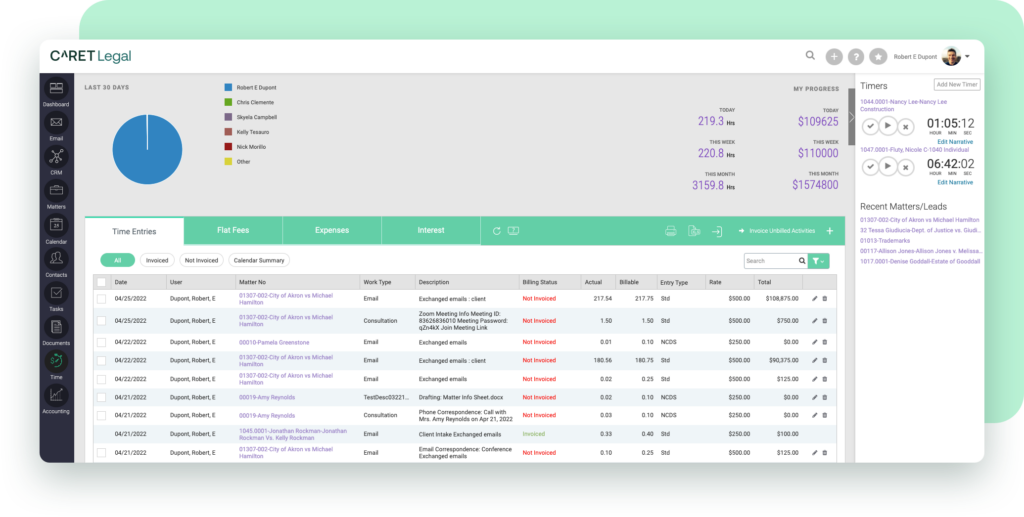A firm that values efficiency and respects personal time will foster an environment where productive time management strategies are encouraged and rewarded.
Deadlines, client meetings, court appearances, and the constant need for research and preparation can make it feel like there are never enough hours in the day. With caseloads increasing and client demands escalating, these attorney time management tips can be the difference between success and stress.
Our Favorite Time Management Tips for Lawyers
It’s easy to get caught up in the daily grind without taking a moment to step back and examine our processes. Are we really managing our time as effectively as we could be? Could we be working smarter, not harder? Are there task tools that can make us more efficient? Although you may already be implementing some of these attorney time management tips, there are likely still areas where your firm could improve.
1. Prioritize tasks based on urgency and importance

Prioritization means differentiating between tasks that require immediate attention and those that can be scheduled for later. In a law firm, your tasks can range from attending critical court appearances and client meetings to handling internal administrative duties and professional development activities. Each task carries its own level of urgency and importance, with tasks that are both urgent and important taking priority over everything else.
The challenge lies in prioritizing everything else. This is where a tool like the Eisenhower Matrix can be invaluable. Named after President Dwight D. Eisenhower, who famously said, “What is important is seldom urgent, and what is urgent is seldom important,” this matrix helps law firms ensure that all tasks, regardless of their urgency, receive the attention they deserve. It also helps prevent the common pitfall of becoming too caught up in putting out fires (urgent but not important tasks) at the expense of strategic, long-term work (important but not urgent tasks).
2. Time-block your calendar to ensure bandwidth
Time blocking is a time management method that involves allocating specific time slots for different tasks throughout the day. It promotes organization and ensures adequate time is dedicated to each task, thereby reducing the chances of last-minute rushes and missed deadlines. By visually mapping out the day, attorneys can gain a clearer understanding of their time allocation and make necessary adjustments. They can see at a glance which tasks are taking up most of their time, which time slots are free, and whether anything needs to be updated based on priority. This visual overview can be particularly useful in identifying inefficiencies and areas where time management can be improved.
3. Delegate to free up time for more important tasks
Delegation, though challenging for some, is crucial for effective time management. By assigning tasks to paralegals, legal assistants, or junior associates, attorneys can concentrate on tasks that truly require their expertise, enhancing overall productivity. Taking the time to prioritize tasks and blocking your calendar can make it easy to see which tasks you have to directly contribute to, and what can be easily delegated out.
Taking the time to prioritize tasks and blocking your calendar can make it easy to see which tasks you have to directly contribute to, and what can be easily delegated out.
4. Harness technology to automate tasks when possible
There are a range of legal-specific tools that contribute to time management by automating time-consuming and mundane tasks. From time and billing software that automates invoice creation to calendaring software that sends reminders for upcoming deadlines and meetings, legal practice management technology is one of the most effective ways to streamline your firm’s workflows. Furthermore, it reduces the risk of errors and oversights, ensuring that the firm’s work is accurate and reliable.
5. Practice the art of saying “No”
In the quest to maximize billable hours, it can be tempting to take on every case that comes along. However, an overloaded schedule can lead to decreased productivity and increased stress. Saying “no” involves evaluating each potential case or task in terms of its urgency, importance, and the firm’s available resources. It also requires a clear understanding of the firm’s strategic goals and priorities.

Maximize billable time with CARET Legal’s timetracking capabilities
Saying “no” also extends to internal tasks. Decline non-essential meetings or activities that do not contribute significantly to high-priority tasks. You can also push back against unrealistic deadlines or expectations, negotiating for more reasonable timelines that allow for quality work.
… And don’t forget to take breaks! Studies have shown that short breaks can help rejuvenate the mind, leading to better focus and improved performance when you return to your tasks.
The Value of Work-Life Balance in Attorney Time Management
While the focus of most attorney time management tips revolves around enhancing productivity at work, it’s equally important to consider the impact these strategies have on a lawyer’s personal life and work-life balance. By incorporating strategies that promote daily time management, attorneys can avoid burnout and sustain their productivity in the long run.
A firm that values efficiency and respects personal time will foster an environment where productive time management strategies are encouraged and rewarded. On the other hand, a firm that promotes a culture of long hours and constant availability can make it challenging for attorneys to manage their time effectively. It’s essential for law firm leadership to recognize the role they play in promoting effective attorney time management and take steps to create a supportive environment.
There’s Always Room for Improvement
By prioritizing tasks, utilizing time blocking, delegating when appropriate, leveraging technology, and learning to say no, you can take control of the day. By mastering these time management skills, attorneys can ensure they are delivering their best performance for their clients while also taking care of their own well-being.
